#my Heart




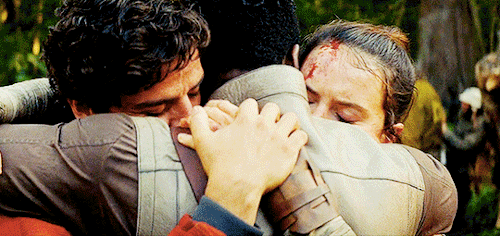
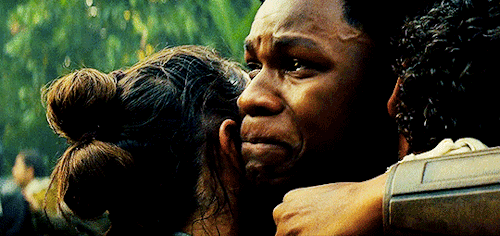
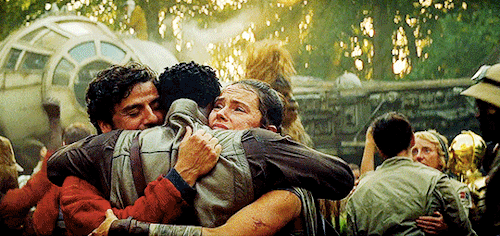
#my heart
More Posts from Lune-versatile and Others
Master List: Motivation
Guide: Dealing with Self-Doubt & Impostor Syndrome Guide: How to Rekindle Your Motivation to Write Guide: Filling Your Creative Well 5 Reasons You Lost Interest in Your WIP, Plus Fixes! Would Rather Be Doing Other Things Feeling Unmotivated with WIP Getting Unstuck: Motivation Beyond Mood Boards & Playlists Writing and Depression Trouble Getting Started Getting Your Writing Magic Back After a Break Building Confidence in Your Writing Even When You Suck Writer’s Block Have Plot, Can’t Write Concentrate on Quantity at First, Not Quality Want to Write but Can’t Come Up with a Plot How Do You Know if Your Story is Good Getting Excited About Your Story Again It’s Never Too Late to Become a Writer Comparing Self to Others, Insecure About Writing
Writing Related Fears:
Overcoming Embarrassment Over Own Writing Getting Over Fear of Comparison Diversifying a Story That’s Similar to Existing Story Stopped by Fear of Editing Worried About Writing Style Delaying Writing Out of Fear Finding the Courage to Share for the First Time Afraid of Looking Back and Seeing Bad Writing Afraid of Ideas Being Stolen or Copied Once Shared Afraid of Openly Sharing Writing
The First Thing You Learn in University Creative Writing Classes
I was very fortunate to major in Creative Writing when I went to college. It was a great experience, but I remember being so nervous when I walked into my first class as a freshman.
I'd been writing stories since elementary school, so I worried that this first class would teach me something wildly different than what I knew about writing. Maybe there was some secret formula to creating characters or mental exercises that immediately dissolved writer's block that you could only learn from a professor.
When my first class ended, I was shocked.
The first thing you learn in a university-level creative writing class?
Read more than you write.
It's that simple. I thought my professor had lost his mind, but the many others that followed always echoed the advice.
The advice then saved my ability to write when I was getting through each day during some of the hardest times of my life.
Pick up the good books. The great books. The terrible books that make you quit reading them because they're so bad.
They will all make your writing stronger.
You'll learn how to write fantastic characters, weave plot lines, and paint worlds with words. You'll also learn what you don't like in someone's writing so you can avoid it in your own.
Even during the periods when I wrote nothing at all, reading kept that love for writing alive in my heart.
It's the best way to reconnect with that passion if you've lost it and the greatest way to develop that skill.
Read more than you write.
Your storylines and characters will thank you later.
I hate to say this, and like, rain on everyone’s parade, but after scrolling past three posts about it on a writing tag …
If you are looking up synonyms to exchange words out in your story with the purpose of sounding smarter, more sophisticated, or complicated to your reader, you are probably abusing the thesaurus.
Now, if you *want* to do this, I mean, you can write whatever or however you want! But I just want you to know that this is frowned upon if you are trying to write at a professional level.
I have an old article on this somewhere …


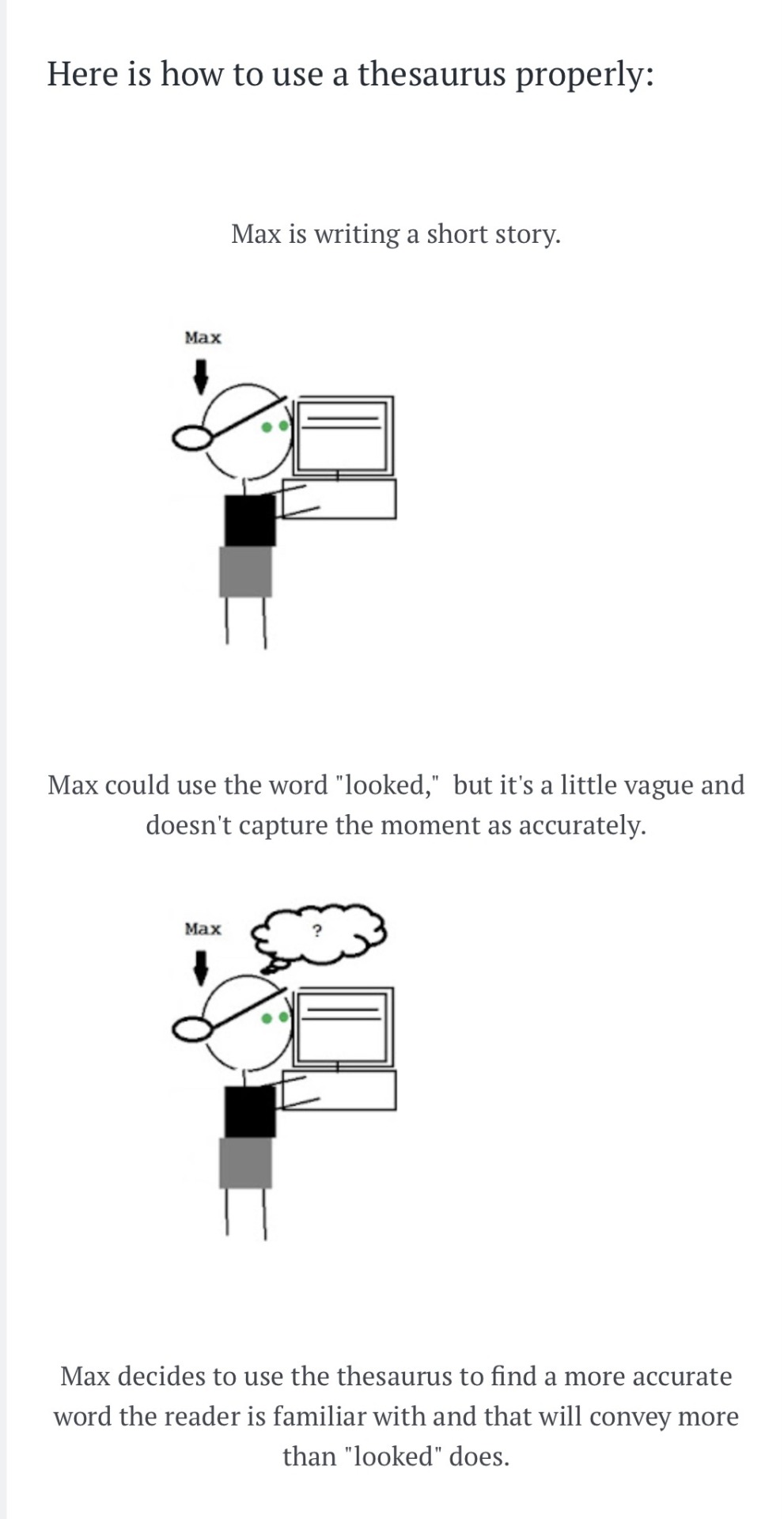

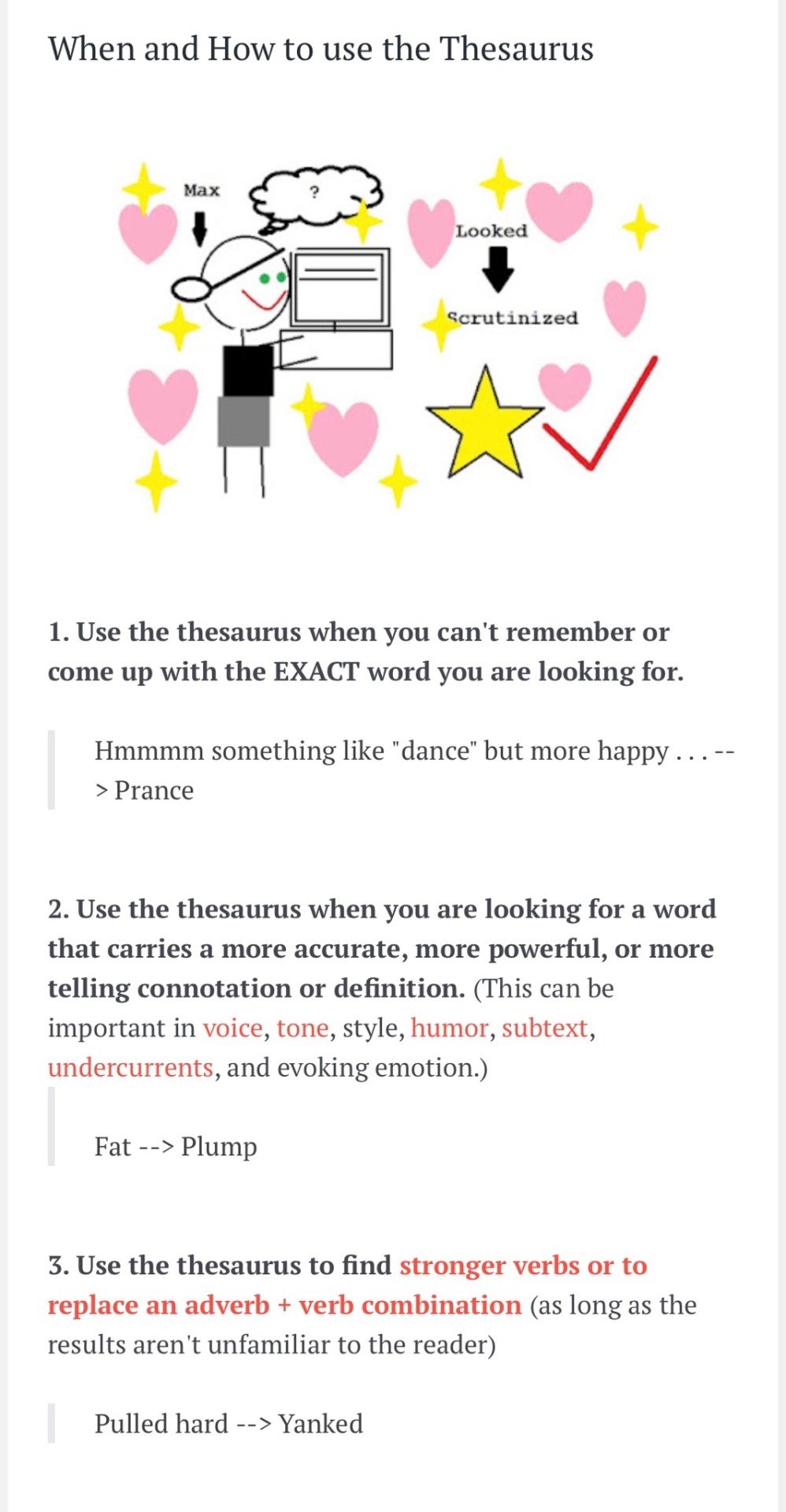

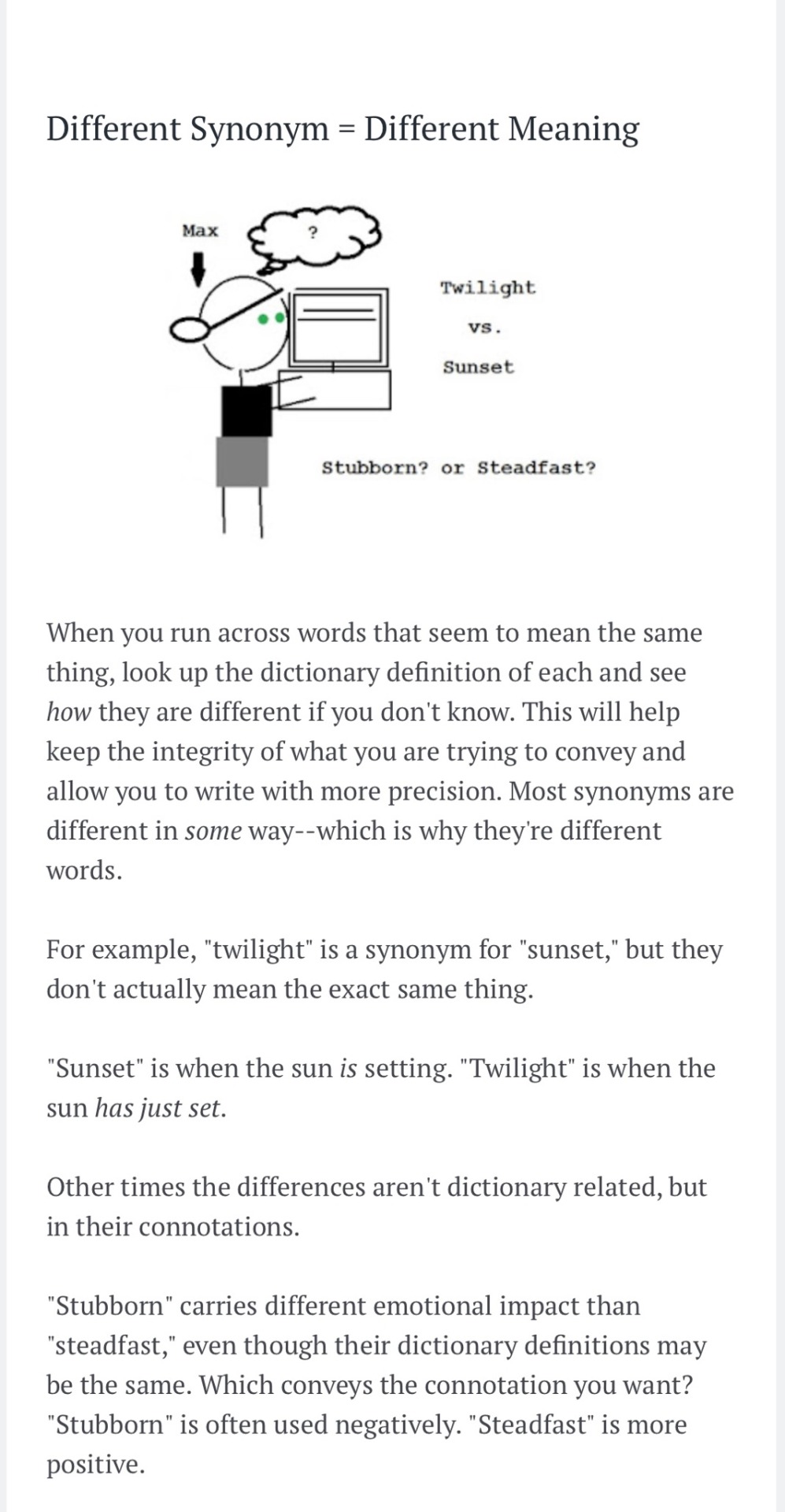
If you want to look at the original article…
https://www.septembercfawkes.com/2018/08/how-to-use-thesaurus-properly.html

How do you find a balance between “show, don’t tell” and “readers might not catch/understand this subtle concept or showing it would be too convoluted or more open to interpretation than it needs to be”? It doesn’t help that everyone encourages more showing even if it swallowing little details that are supposed to stand out. Basically, I feel like I overthink my showing as being too tell-y even when it already has several layers of meaning and is already too dense for average readers.
“Show don’t tell” resources & advice...
I think people often mistake the advice of “show don’t tell” as being in the interest of making one’s writing more literary; more “high art” than candid prose typically is. The advice is intended to help one recognize when their prose is becoming dull or unengaging to the reader. Showing is supposed to promote an organically flowing reading experience, rather than turn the writing into a flowery, pretentious, and unintelligible mess. Finding a satisfying way to deliver information in the text that isn’t “I felt” or “I thought” is important. It should never dilute the information. Clarity comes first, and then one can configure the sentence to add as much richness to the reader’s ability to immerse themselves as possible.
If the desire is to show that the character is sad, writing that “she looked down at the floor and wrapped her arms around her own waist” is not going to be any less indicative of that information than “she felt sad”. That is the point of this advice. It is not a way for one to convert information into a code that the reader must analyze in order to comprehend the basic idea of what the scenes are about. This isn’t 1597, and nobody is asking anyone to be Shakespeare.
Density of a piece of writing does not give it inherent worth. Ease of comprehension doesn’t always have to be the number one priority, but it should be a considerable factor when one accounts for their audience and their subject matter. If one is writing a young adult fantasy trilogy, the density of the writing should be adherent to the demographic’s ability to comprehend certain writing styles. “Show, don’t tell” applies to all writing, but different writers interpret it differently, often based on who they’re writing for. If the concept you’re trying to convey to the reader in a subtle manner is not coming across without blurting it out in the text, perhaps the problem isn’t the way you’re describing it, but the concept is weak in its current state.
Easily misinterpreted meanings or concepts are often not the victim of descriptive style, but being underdeveloped sub textually. No important concept can be described once within a dense text and expected to translate as intended into the reader’s understanding. If it’s important enough to the bones of your story and meaning, it shouldn’t rely on the manner of description to shine through. Sometimes the density of a text is a product of too much intentional symbolism or motif. It’s okay to allow some things to be meaningful purely in interpretation. It’s okay to acknowledge that you allowed something that obviously implies meaning to be prescribed its implications by the readers.
Here are some of my other resources on the topic that you may find helpful:
Resources For Describing Characters
Resources For Describing Emotion
Conveying Emotions
All About Colors
A Writer’s Thesaurus
Showing VS Telling in First Person POV
Using Vocabulary
Balancing Detail & Development
+ When To Use “Felt”
Showing Vs Telling
How To Better Your Vocabulary & Description
Describing emotion through action
Improving Flow In Writing
How To “Show Don’t Tell” More
–
Masterlist | WIP Blog
If you enjoy my blog and wish for it to continue being updated frequently and for me to continue putting my energy toward answering your questions, please consider Buying Me A Coffee, or pledging your support on Patreon, where I offer early access and exclusive benefits for only $5/month.
we always say that writing improves with practice, which is true & good to remind people of, but i think we fail to emphasize that literally every part of your writing will get better with time and effort. sure, your prose will become clearer and more sophisticated, but it’s so much more than that.
you’ll become so much faster, for one thing. if it takes you two weeks to complete a 3k chapter when you start out, you’ll eventually reach a point when you can crank that out in a matter of days. maybe right now your story ideas are like a dripping faucet–slow, random, and occasional. well, the longer you let that faucet run, the more your ideas will start to flow, until suddenly you’re finding inspiration in everything. the length and complexity of your stories will grow too. you might start writing stories in the 2-10k range, but you’ll eventually find that you’re writing 20-30k stories without even really intending to.
of course your style will improve. of course your imagery will become richer. of course your syntax will start to flow better. but there are so many other aspects of the writing process, and literally every single one of them will start getting better too.
Here's some writing resources on worldbuilding, pacing, and story structure, since I see many people struggle with them.
Worldbuilding
Worldbuilding In Fantasy - The Best Advice, Tips And Guide
10 Worldbuilding Tips: How to Write an Engaging Fictional World
Worldbuilding Guide & Template: Your #1 Resource
Pacing
7 Quick Tips for Mastering Pacing in Your Story
Story Pacing: The What, Why, and How for a Fiction Writer
Story Structure
Story Structure: 7 Narrative Structures All Writers Should Know
The Hero's Journey: A 17 Step Story Structure Beat Sheet
Save the Cat Plot Structure
The Three-Act Structure
have fun <3
Creating Fictional Holidays
Every culture and society has holidays! They are often one of the most enjoyable parts of societies and bring people together despite all of their differences. For your story, they are a great way to take your worldbuilding to the next level and make everything feel that much more real. But, Ailey, why does my world even need holidays? Well, personally, holidays are so much fun to create. You can pretty much do whatever you want to do! And, holidays can often provide great opportunitiesfor plots and sub-plots in your story. Holidays can give your characters the opportunity to gather with family, remember the family they lost, get a great deal on a super cute maxi dress, go on a blind date, or go to an awesome costume party. We, as people, need holidays, and so do your characters! So here are some tips on creating holidays for your world.
Basic Questions to Ask Yourself
What are the rituals/traditions of your holiday?
How long is the holiday (just a day, or a week, or a month)?
If the holiday is longer than a day, does it build up? Is there a most important day, and how does that look?
How does religion influence how your holiday is celebrated?
What food is traditionally served?
How do people decorate to symbolize the holiday?
Are there gifts exchanged?
Do people traditionally play games?
Getting Inspiration
The best place to get inspiration for the holidays in your world is by looking at the world around you. Maybe your family has a super cool and quirky tradition that you always wished was a holiday, tweak it a little to fit the circumstances of your world, and boom now it is. Those traditions are important to you for a reason, and often times, family traditions can eventually morph into a national holiday. Outside of that, I would look at the holidays of both modern and national holidays. Ancient Rome and Ancient Greek have plenty of holidays for you to get inspiration from, and there are so many cultures out there that have incredible traditions that you can most certainly turn into holidays! Almost every holiday is rooted in one of five things which we’ll get to next religion, a season, war, labor, and the government. Make sure that applies to your own world as well.
Types of Holidays
Religious Holidays: Your world probably has a primary religion or primary religions. Every religion has holidays that they celebrate to celebrate their god or gods and show their devotion to them. For religious holidays, sacrifice and atonement often play a huge role. Lots of religious holidays include fasting in some part of them. Maybe, there’s a holy person who founded the religion or did something super important and all the people love them. Well then they probably have a holiday or a feast of some kind in their honor. For example, in Catholicism, Saints have Feast Days! I don’t think anyone celebrates every Saint’s Feast Day because that would be like every day of the year. Some people, especially those who live in the Saint’s home town or an area which they are the patron of, have a parade or small festival in their honor on the Feast Day. On the Feast Day of my patron Saint, St. Francis de Sales, I normally will pray a novena which is a prayer you say for nine consecutive days timed so that it ends on his Feast Day, light a candle, say another prayer specific to him on the feast day and maybe bake myself a batch of cookies.
Seasonal Holidays: Seasons are so important to our world, and lots of cultures celebrate them. Lot of important events rotate around the seasons: harvest, planting, fertility, hunting, hibernation. They mark our journey in life, year after year, and allow us to reflect on all of life’s changes. How your people celebrate seasonality is up to you. You could fashion it after holidays like the Summer and Winter Solstice or the Autumn Equinox. A holiday celebrating summer in my world takes some inspiration from May Day celebrations in England. The holiday could literally be as simple as a festival that celebrates the season’s arrival which could be really interesting if your world has different seasons than ours. Or the holidays could be more complex, tying in cultural values with the seasons. I, personally, would love to see a world with different seasons for a world that has more than four seasons because I think that could bring in some really cool holidays and festivals
War/Government Holidays: There was most likely a war or a series of wars in the history of your world. People love freedom. It’s a core value for so many people and so many countries. Therefore, most countries like to have a holiday celebrating the day they won their freedom. Almost every country has some kind of Independence Day celebration. If your country has never had to gain their independence, they’ve probably still fought and won a war before. They may celebrate their victory and take the time to remember those who died during the war like many European countries on Victory in Europe Day to celebrate the End of World War 2. Then you have your government holidays like Presidents Day in the US which isn’t really celebrated, but I do get a day off of school, so that’s always nice. Maybe the ruler of your country has decreed that their birthday is a national holiday in honor of them. Or going along with holiday’s celebrating independence, maybe the country celebrates the birthday of their founder every year in a national holiday!
Labor Holidays: And lastly, we have our labor holidays, which are some of the best holidays in my opinion. Everyone needs a break at times. Labor holidays acknowledge that, and they give you the day off with absolutely zero strings attached. No church, no war to hold remembrance for, just a party with your friends, no school and no work. These holidays are not the best but also probably some of the most important. If the people in your world work five days a week (assuming weekends and a similar calendar schedule) without any long breaks, they are going to get burnt out. Burnt out people are easily irritable, and easily irritable people lead revolutions. Giving your people a holiday where they don’t have to think about anything else other than themselves is a great way to keep the people appeased!
A pretty cool list of questions for your characters. Personally, I've been doing this by having it in an interview style series of questions for my character, Ktangha.
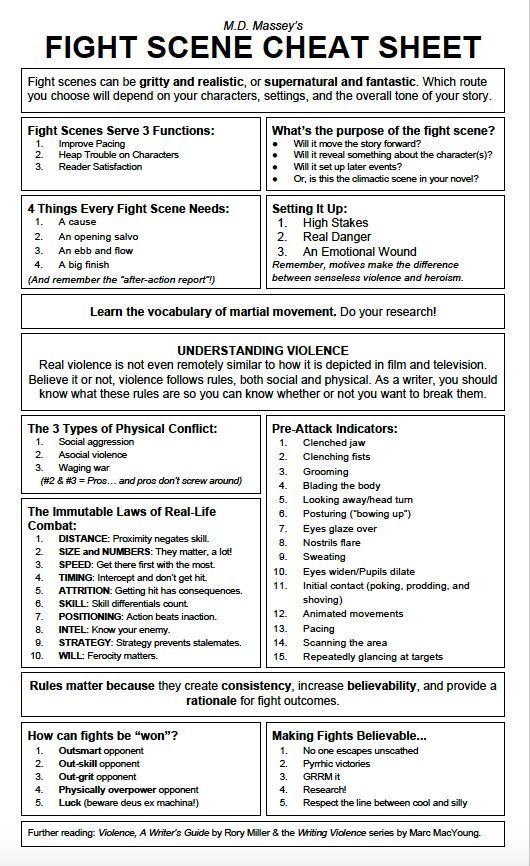
Writing tool for your fight scenes.
-
 i-need-a-pilot-tho reblogged this · 6 days ago
i-need-a-pilot-tho reblogged this · 6 days ago -
 melissasaurus reblogged this · 6 days ago
melissasaurus reblogged this · 6 days ago -
 cecildennis liked this · 6 days ago
cecildennis liked this · 6 days ago -
 rapunziedameron reblogged this · 6 days ago
rapunziedameron reblogged this · 6 days ago -
 stardustviolet reblogged this · 1 week ago
stardustviolet reblogged this · 1 week ago -
 kaijulius liked this · 1 week ago
kaijulius liked this · 1 week ago -
 madroxed reblogged this · 1 week ago
madroxed reblogged this · 1 week ago -
 1llusionmachine reblogged this · 1 week ago
1llusionmachine reblogged this · 1 week ago -
 volvervolver reblogged this · 1 week ago
volvervolver reblogged this · 1 week ago -
 villainette liked this · 1 week ago
villainette liked this · 1 week ago -
 vivathewilddog liked this · 1 week ago
vivathewilddog liked this · 1 week ago -
 quicksilvermad liked this · 1 week ago
quicksilvermad liked this · 1 week ago -
 panzertorte liked this · 1 week ago
panzertorte liked this · 1 week ago -
 leiakenobi reblogged this · 1 week ago
leiakenobi reblogged this · 1 week ago -
 elementalmoments liked this · 1 week ago
elementalmoments liked this · 1 week ago -
 leapyeap reblogged this · 1 week ago
leapyeap reblogged this · 1 week ago -
 powerangersemo reblogged this · 1 week ago
powerangersemo reblogged this · 1 week ago -
 lostacanthus reblogged this · 1 week ago
lostacanthus reblogged this · 1 week ago -
 lostacanthus liked this · 1 week ago
lostacanthus liked this · 1 week ago -
 flatspot liked this · 1 week ago
flatspot liked this · 1 week ago -
 fanpersoningfox liked this · 1 week ago
fanpersoningfox liked this · 1 week ago -
 betweentimes liked this · 1 week ago
betweentimes liked this · 1 week ago -
 zweizimtsterne reblogged this · 1 week ago
zweizimtsterne reblogged this · 1 week ago -
 zweizimtsterne liked this · 1 week ago
zweizimtsterne liked this · 1 week ago -
 poggyschuyler reblogged this · 1 week ago
poggyschuyler reblogged this · 1 week ago -
 bigdicktozier reblogged this · 1 week ago
bigdicktozier reblogged this · 1 week ago -
 thermocrying reblogged this · 1 week ago
thermocrying reblogged this · 1 week ago -
 thermocrying liked this · 1 week ago
thermocrying liked this · 1 week ago -
 acepilct reblogged this · 3 weeks ago
acepilct reblogged this · 3 weeks ago -
 sentinelofstories reblogged this · 1 month ago
sentinelofstories reblogged this · 1 month ago -
 sentinelofstories liked this · 1 month ago
sentinelofstories liked this · 1 month ago -
 arytra reblogged this · 1 month ago
arytra reblogged this · 1 month ago -
 coeur-dacier liked this · 1 month ago
coeur-dacier liked this · 1 month ago -
 michaelormewood reblogged this · 2 months ago
michaelormewood reblogged this · 2 months ago -
 farialyton liked this · 2 months ago
farialyton liked this · 2 months ago -
 buriedenginethatcould reblogged this · 3 months ago
buriedenginethatcould reblogged this · 3 months ago -
 buriedenginethatcould liked this · 3 months ago
buriedenginethatcould liked this · 3 months ago -
 aheavenlylake liked this · 3 months ago
aheavenlylake liked this · 3 months ago -
 releasing-my-insanity reblogged this · 3 months ago
releasing-my-insanity reblogged this · 3 months ago -
 catalogercas liked this · 3 months ago
catalogercas liked this · 3 months ago -
 pomegranate-ghost liked this · 3 months ago
pomegranate-ghost liked this · 3 months ago -
 logo-comics reblogged this · 3 months ago
logo-comics reblogged this · 3 months ago -
 short-wooloo reblogged this · 4 months ago
short-wooloo reblogged this · 4 months ago -
 hissed-the-lovecatss liked this · 4 months ago
hissed-the-lovecatss liked this · 4 months ago -
 call-me-overthinker liked this · 4 months ago
call-me-overthinker liked this · 4 months ago -
 lady-needless-litany reblogged this · 4 months ago
lady-needless-litany reblogged this · 4 months ago -
 lady-needless-litany liked this · 4 months ago
lady-needless-litany liked this · 4 months ago -
 seriesmaniac reblogged this · 4 months ago
seriesmaniac reblogged this · 4 months ago -
 seriesmaniac liked this · 4 months ago
seriesmaniac liked this · 4 months ago -
 patricks-fabulous-face liked this · 4 months ago
patricks-fabulous-face liked this · 4 months ago

